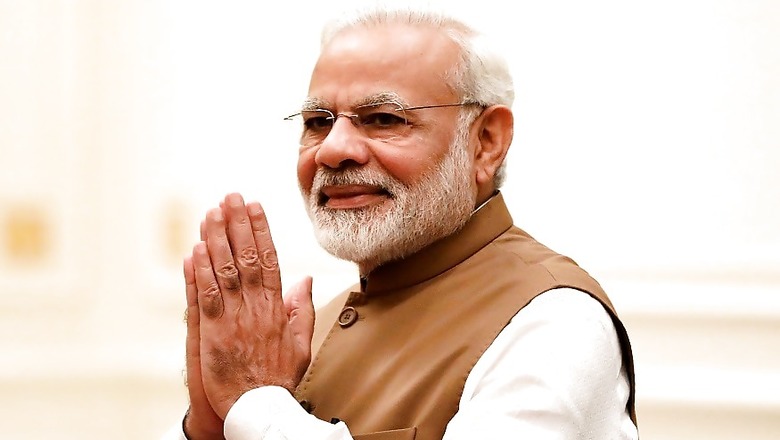
views
Who would not support the Self-reliant India Mission? This is something that's at the core of Indian ethos and connects directly with the people. This is another name of 'swadeshi'. Mahatma Gandhi used the idea of swadeshi to defeat the British, and his swadeshi was a manifestation of self-reliance. I see Prime Minister Narendra Modi’s 30-minute televised address to the nation as a course correction, with the resolve to go on the path of promoting local, which obviously is an anti-thesis of the globalisation of today. A path to see India economically independent and self-reliant.
Observing history, we find that countries of the present-day developed world didn't progress by copying the development models of other countries. They devised their own strategies and policies to develop themselves. But it seems in their obsession with the models of other countries, our policymakers neither posed trust in the people nor in the ethos, thought process and the entrepreneurial spirit of the citizens. They didn’t ever have confidence that people can be kept at the centre of any development inspiration. Not that our people didn't have the capacity or capability; the problem was in the mindset of our policymakers.
In the last 70 years, policymakers never trusted our indigenous industries, resources and entrepreneurs. That is, we did not trust ourselves. From 1950 onwards, our policymakers led by Jawaharlal Nehru were obsessed with the Russian model of development: he tried this model, which is also called the Nehru-Stalin Model. Public sector-based philosophy was at the core of this model. It was thought that the public sector would spearhead the growth of this country, and this would usher in the growth of consumer goods industry and agriculture, and the services sector was not given any heed. Suddenly, in 1991, it was realised that the model on which our economy was based had failed, and the country was in trouble due to mounting foreign debt, depleted foreign exchange reserves, and danger of sovereign default was looming.
It was said that the only way the economy could be saved was by adopting the path of globalisation (based on the Washington Consensus). We handed the baton over to Foreign Direct Investment (FDI), and multinational corporations, i.e, foreigners. This new system was capital-based, and that too foreign capital-based. Monopolisation and capturing markets was the priority of the big foreign capital. The obvious argument put forth in defence of this model was the accelerated growth that happened afterwards. Growth in GDP did happen after 1991 due to production of more luxury goods and also due to the services sector, serving primarily the beneficiaries of that GDP growth. However, if we see closely, that growth was jobless, faceless, rootless and above all ruthless. By allowing the import of subsidised Chinese goods on the one hand, and foreign capital to acquire our already well-run companies (what we call brownfield FDI) in the name of globalisation, we invited job losses and economic inequalities within our own border, and the menace of unmanageable balance of trade and current account balance of payment deficit.
Unbridled globalisation of this kind sent several local industries out of business. The obvious outcome was decline of local manufacturing, job losses and pauperisation of the working class and also the rural population, as agriculture and the rural economy was totally out of focus in the narrative of the LPG (Liberalisation, Privatisation and Globalisation) policies. Unemployment and poverty made people dependent on government doles.
They were being made dependent on government support, instead of nurturing them into valuable contributors to society.
MNREGA and Right to Food started becoming new norms. But they are all doles to keep people silent and believers in the democracy. However, this policy can’t make people contribute to social and economic development. In the absence of any light to go forward to make growth more participatory, inclusive and job-oriented, talks were on to provide universal basic income, which was another form of doles to the people.
This cannot go on. However, in the present narrative of globalisation and private corporate and MNCs-based model of carrying out economic activities, these are the only solutions, though they are obviously untenable.
PM Narendra Modi has been pushing for make-in-India, start-ups, Khadi etc. However, the policy of dependence on imports facilitated by lower tariffs and thoughtless FDI/FPI continued unabated.
That is why we can say that PM Modi’s push for ‘local’, what has been termed as 'vocal for local', is a step in the direction of self-reliance, which was needed for a long time. It is time to revive those local industries that were taken for granted in the era of globalisation. It is time to usher in economic policies that produce welfare, sustainable incomes, help job creation and, all in all, put faith in the people.
We should not forget that the sad state of our social sectors is also due to the lack of public expenditure on health and education, which is a side effect of the withdrawal of the government from the social sector, and handing over these welfare-enhancing sectors to private profiteers.
Modi’s call is sunrise for a new day.
PM Modi, with his historic speech, has set the foundation for India to take not only a quantum jump, but also create more opportunities and respect for indigenous entrepreneurs. The PM’s call to be 'vocal for local', will have strong resonance. The PM’s appeal has a large reach, and it will strengthen indigenous and local brands among the consumers, to ultimately become global brands. The constant endorsement of PM Modi would help these entrepreneurs get more respect and acceptance globally.
To deal with the miseries caused by the Chinese virus, different countries have been making efforts with the government and the quantum of this support is measured by the support in terms of percentage of GDP.
In this context, the PM’s bold step of stitching together a package of Rs 20 lakh crore, nearly 10 per cent of GDP, offering relief and opportunities for labour, small retailers, small entrepreneurs, microenterprises along with farmers, honest tax payers and other businesses, can not be termed just as a relief in the present crisis. Perhaps, on the face of it, this can be seen as a package to rebuild our base for small businesses, which had been suffering for long, due to onslaught of China, apathy of the governments and dominance of foreign capital. Push for local will help achieve this goal.
So this opportunity needs to be used to rebuild the economy based on local manufacturing and other businesses.
This will take the country into a more positive direction.
We can expect that this package will not only lead to ending the ills of badly designed and implemented 1991 liberalisation and subsequent integration into exploitative globalisation, but will also lead to employment-oriented inclusive growth.
Though talks of trade war, putting brakes on globalisation had started long ago, we see the mood the world over has further accelerated with attack of the Chinese virus and the resulting pandemic. This has accelerated the collapse of the existing model of globalisation. The model, which is not only exploitative but has also reduced the opportunities for job creation. The era of economies of scale is passé, and the forthcoming era is of economies of scope. The Chinese virus will be a natural non-tariff barrier for various products in many jurisdictions. The PM’s statement that during the pandemic, 'local' has been extremely supportive and saved countrymen from miseries is important. In the new era, push for local, would help these local businesses to prosper.
In this context, PM Modi is absolutely right when he says that the Indian model of globalisation would be more inclusive and will lead to opportunities not only in India, but also in the partner emerging economies. India’s business ethos always believed in partnership, not exerting ownership. PM Modi’s call for rebuilding globalisation on the principles of ‘Vasudhaiva Kutumbakam’, or 'the world is one family', gels with Indian thought process.
The Prime Minister has identified this situation as an appropriate time to take a quantum jump.
PM Modi has determined five pillars for achieving self-reliance: a) economy with potential for quantum jump, not incremental growth, b) investments in infrastructure, c) technology-driven services, d) demographic dividend and e) reforming the supply chain.
Along with push for growth which is essential to put the economy on track with orientation towards sustainability, employment growth, inclusive growth and equality in distribution, an opportunity has arisen due to this pandemic, and that is a large number of companies are now unwilling to continue their production centres in China and want to relocate. Many are eyeing India as their favourite destination, and India too wants to seize this opportunity to add one more engine to its growth story. This plug-and-play model of attracting these companies could be a good strategy. However, there is a note of caution, that we should not tweak our laws to their advantage and against the interests of our working class, including farmers.
We need to be judicious in our approach. For all those global investors who want to shift their base from China to India, we can facilitate them with providing land and infrastructure with a rider that they do backward integration for utilisation of domestic content and secondly they should not eye our domestic market and be constrained with an obligation to export a significant part of their production. These two conditions, namely ‘domestic content requirement’ and ‘export obligation’ are no new conditions; they are most common riders imposed on foreign investors in different countries. There is yet another condition which needs to be imposed on foreign investors, and that is imposition of a cap on outgo of royalty and technical fee. It’s most unfortunate that the UPA government lifted the cap on outgo of royalty by MNCs and that was never attempted to be reimposed. In light of new developments, it’s time to stem the outgo of royalty for existing as well as prospective investors.
(The author is National Co-convener, Swadeshi Jagran Manch. Views expressed are personal)



















Comments
0 comment